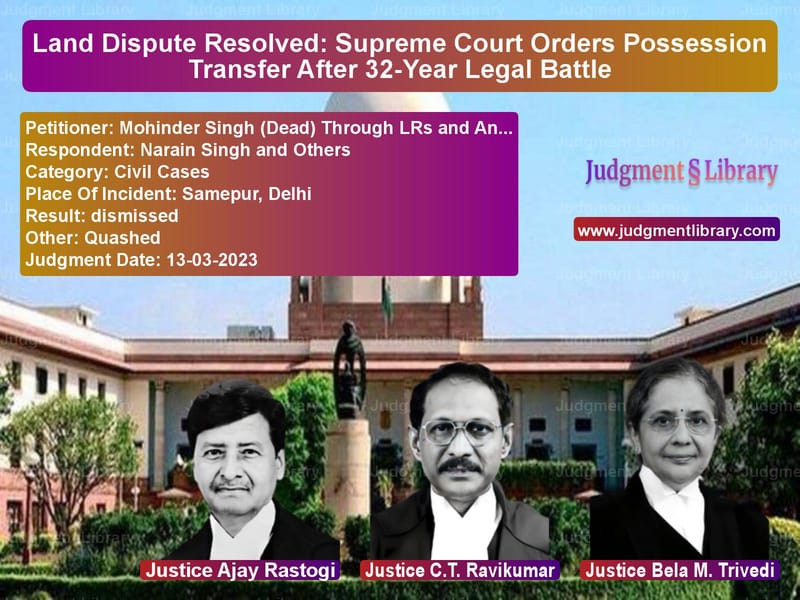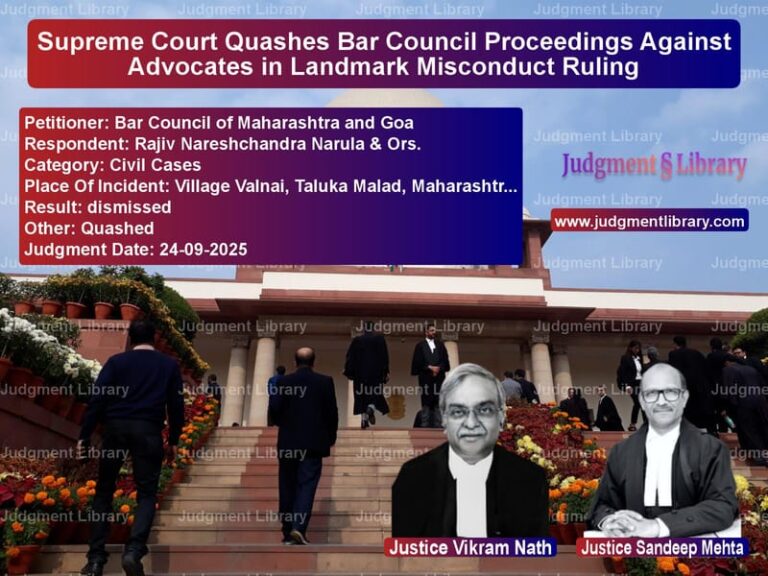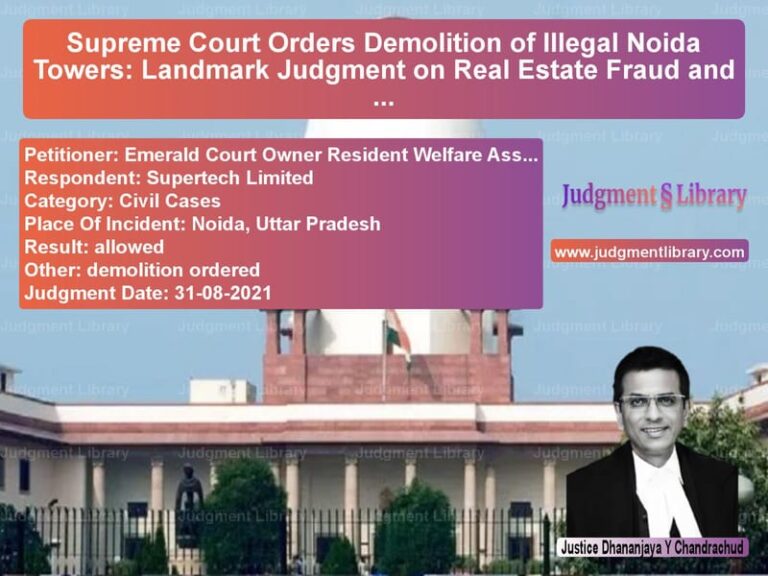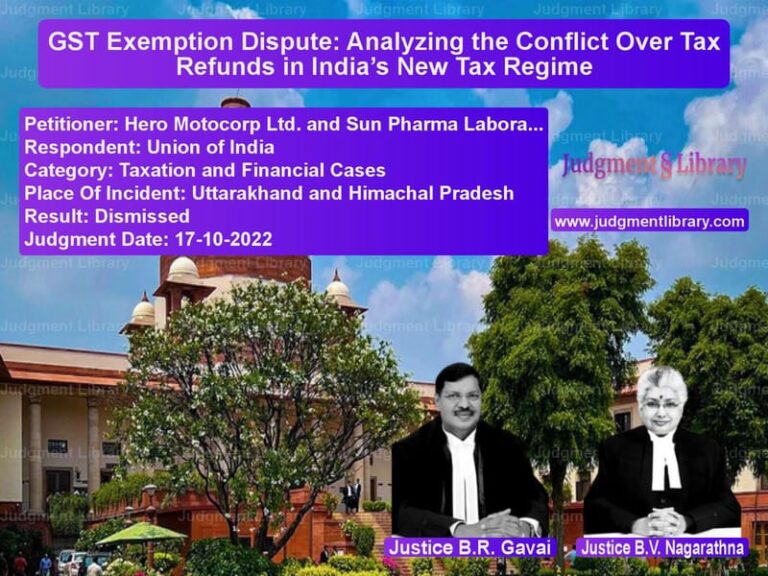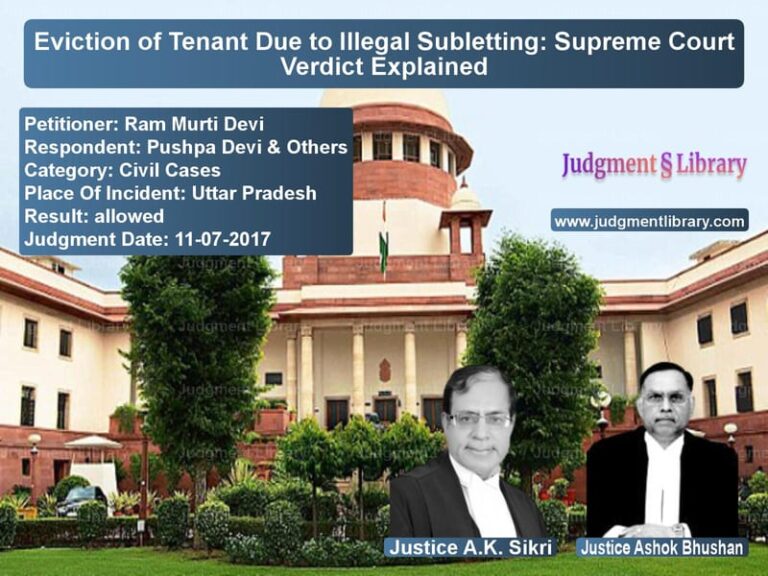Land Dispute Resolved: Supreme Court Orders Possession Transfer After 32-Year Legal Battle
The Supreme Court of India recently delivered a crucial judgment in a decades-old land dispute case between Mohinder Singh and Narain Singh. The case revolved around the validity of land transactions and the jurisdiction of different laws governing rural and urban land. The Court upheld the principle that once an area is urbanized under the Delhi Municipal Corporation Act, 1957, the provisions of the Delhi Land Reforms Act, 1954, cease to apply. This ruling had significant consequences for the litigants, as it ended a 32-year-old litigation over land ownership and possession.
Background of the Case
The dispute concerned land measuring 4 Bighas and 18 Biswas in village Samepur, Delhi. The original owner, Maman Singh, sold the land to Bhai Ram through a registered sale deed dated March 9, 1970. Later, on May 4, 1989, Maman Singh executed another sale deed in favor of Narain Singh and Som Dutt. The new buyers applied for mutation under the Delhi Land Reforms Act, 1954, and their names were entered into the revenue records on May 31, 1989.
However, Mohinder Singh and his legal representatives challenged this mutation, claiming adverse possession over the land. After rounds of litigation, the Financial Commissioner ruled on February 10, 1995, that the sale was in violation of Section 33 of the Delhi Land Reforms Act, 1954, and ordered the land to vest in the Gaon Sabha.
Arguments by the Appellants (Mohinder Singh & Others)
- The appellants argued that they had been in possession of the land since before the execution of the sale deed in 1989.
- They claimed that the Financial Commissioner’s decision to set aside the mutation in favor of the respondents was justified.
- They contended that urbanization under Section 507(a) of the Delhi Municipal Corporation Act, 1957, did not nullify the rights of parties under the Delhi Land Reforms Act, 1954.
- They emphasized that the 1954 Act was a special law governing land tenure and should prevail over the municipal act.
Arguments by the Respondents (Narain Singh & Others)
- The respondents argued that they had lawfully purchased the land through a registered sale deed in 1989.
- They contended that once an area is urbanized under the Delhi Municipal Corporation Act, 1957, the provisions of the Delhi Land Reforms Act, 1954, cease to apply.
- Their legal right to possession was being wrongfully denied despite having valid ownership.
- They urged the Court to direct the appellants to hand over possession of the land, as they had been deprived of it for over three decades.
Supreme Court’s Observations and Ruling
The Supreme Court analyzed the interplay between the two laws governing land in Delhi:
- The Delhi Land Reforms Act, 1954, applied only to rural areas.
- Once an area is notified as urban under Section 507(a) of the Delhi Municipal Corporation Act, 1957, it ceases to be governed by the 1954 Act.
- The mutation proceedings under the 1954 Act became non est (invalid) after urbanization, leaving the parties to seek remedies under the applicable laws governing urban areas.
- The Delhi Development Act, 1957, takes precedence in matters related to development and land use planning in urbanized areas.
The Court upheld the judgment of the Delhi High Court, which had ruled that the proceedings under the 1954 Act were void once the area was urbanized. The Supreme Court observed:
“Once a notification has been published in exercise of power under Section 507(a) of the Delhi Municipal Corporation Act, 1957, the provisions of the Delhi Land Reforms Act, 1954, cease to apply. The proceedings pending under the 1954 Act become non est and lose their legal significance.”
Final Judgment
The Supreme Court dismissed the appeal filed by Mohinder Singh and his legal heirs. The Court exercised its power under Article 142 of the Constitution of India to ensure complete justice. It directed the appellants to hand over possession of the land to the rightful owners within two months. If they failed to do so, the respondents were permitted to seek assistance from the judicial magistrate and local administration to enforce the order.
Impact of the Judgment
This ruling has significant implications:
- It reinforces the legal principle that urbanization nullifies the application of rural land laws.
- It provides clarity on jurisdictional issues in land disputes where areas transition from rural to urban.
- It prevents misuse of outdated laws to obstruct legal ownership in urbanized areas.
- It establishes a precedent for similar cases where possession has been wrongfully retained despite valid land transfers.
Conclusion
The Supreme Court’s decision in this case puts an end to a 32-year legal battle over land ownership and possession. By upholding the transition of legal jurisdiction from rural to urban laws, the Court has set a strong precedent for future disputes involving land transitions. The ruling ensures that legal property owners are not deprived of their rights due to procedural roadblocks or misuse of outdated laws.
Petitioner Name: Mohinder Singh (Dead) Through LRs and Another.Respondent Name: Narain Singh and Others.Judgment By: Justice Ajay Rastogi, Justice C.T. Ravikumar, Justice Bela M. Trivedi.Place Of Incident: Samepur, Delhi.Judgment Date: 13-03-2023.
Don’t miss out on the full details! Download the complete judgment in PDF format below and gain valuable insights instantly!
Download Judgment: mohinder-singh-(dead-vs-narain-singh-and-oth-supreme-court-of-india-judgment-dated-13-03-2023.pdf
Directly Download Judgment: Directly download this Judgment
See all petitions in Property Disputes
See all petitions in Landlord-Tenant Disputes
See all petitions in Specific Performance
See all petitions in Judgment by Ajay Rastogi
See all petitions in Judgment by C.T. Ravikumar
See all petitions in Judgment by Bela M. Trivedi
See all petitions in dismissed
See all petitions in Quashed
See all petitions in supreme court of India judgments March 2023
See all petitions in 2023 judgments
See all posts in Civil Cases Category
See all allowed petitions in Civil Cases Category
See all Dismissed petitions in Civil Cases Category
See all partially allowed petitions in Civil Cases Category

